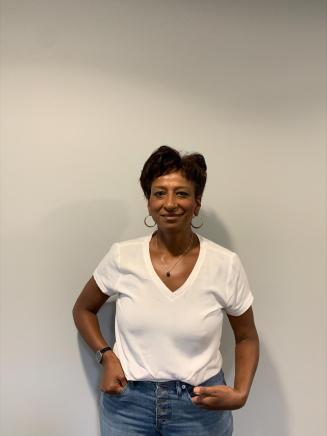Interview with Eric Fleming
IntervieweeInterview with
Eric Fleming
InterviewerInterviewed by
Peter Moran
InterviewerInterviewed by
Abbie Cowan
Date2022 April 22
Mediumborn digital audio file
DimensionsDuration: 1 Hours, 28 Minutes, 54 Seconds
ClassificationsInformation Artifacts
Credit LineCommunity History Project Collection
Object number2022.20.3a-b
Description(a) Interview with Eric Fleming. Interviewed by Peter Moran and Abbie Cowan on April 22, 2022 at the Connecticut Historical Society, One Elizabeth Street, Hartford. (b) Photograph of Eric Fleming taken at his interview. He was interviewed as part of the Connecticut Historical Society's Community History Project discussing his experience during the COVID-19 Pandemic.
Eric Fleming is 60 years old and is a Walt Disney employee at ESPN. He first heard about COVID-19 at home in late January/early February 2020 through the news.
The first major disruption to his daily life occurred when the NBA shut down after a basketball player tested positive for COVID-19. Then all of the major sports leagues began to shut down, which had a major impact on his work at ESPN.
He was nervous because COVID-19 was not something that could be seen. He related it to the war on terror and 9/11 – you could see the planes crashing into the buildings and the buildings falling, but you could not see the COVID particles in the air.
The biggest disruption to his life was working from home. His routine was changed and he was uncertain of having to work from home (if he was able to, if he had the proper equipment, and the space within the house).
At the very beginning of the pandemic no precautions were taken as everything was still unknown. Within a week or two, he began to wear masks and social distance. He remembers the cloth masks and the debate regarding those and the social distancing dots on the floor of supermarkets and public places.
He described the lockdown as “eerily quiet” – there was no one out except getting essentials and no one out driving on the highway. He remembers gas being very cheap as no one was going anywhere.
He felt like COVID-19 did not discriminate against race/gender/socioeconomic status. With choice comes collective responsibility – the need to help and realize your actions and the impact it has on others (toxic individuality).
Eric Fleming is 60 years old and is a Walt Disney employee at ESPN. He first heard about COVID-19 at home in late January/early February 2020 through the news.
The first major disruption to his daily life occurred when the NBA shut down after a basketball player tested positive for COVID-19. Then all of the major sports leagues began to shut down, which had a major impact on his work at ESPN.
He was nervous because COVID-19 was not something that could be seen. He related it to the war on terror and 9/11 – you could see the planes crashing into the buildings and the buildings falling, but you could not see the COVID particles in the air.
The biggest disruption to his life was working from home. His routine was changed and he was uncertain of having to work from home (if he was able to, if he had the proper equipment, and the space within the house).
At the very beginning of the pandemic no precautions were taken as everything was still unknown. Within a week or two, he began to wear masks and social distance. He remembers the cloth masks and the debate regarding those and the social distancing dots on the floor of supermarkets and public places.
He described the lockdown as “eerily quiet” – there was no one out except getting essentials and no one out driving on the highway. He remembers gas being very cheap as no one was going anywhere.
He felt like COVID-19 did not discriminate against race/gender/socioeconomic status. With choice comes collective responsibility – the need to help and realize your actions and the impact it has on others (toxic individuality).
Label TextListen to interview at http://hdl.handle.net/11134/40002:19641700
NotesSubject Note: The Connecticut Historical Society’s Community History Project (CHP) is a public-facing initiative, focused on contemporary collecting, gathering items of the recent past as well as from events happening today. This program developed community historians to identify, document, and preserve their experiences as residents of Connecticut, and to share these experiences during a series of community presentations. The project focused on the impact of Covid-19 on Connecticans, particularly on Black and Brown communities, funeral homes, and on nursing home and elder care populations.Cataloging Note: This cataloging project was made possible in part by the Institute of Museum and Library Services MA-249472-OMS-21.
Status
Not on view2022 December 13
2022 February 26
2022 December 12
2022 June 8
2022 November 16
2022 June 16










